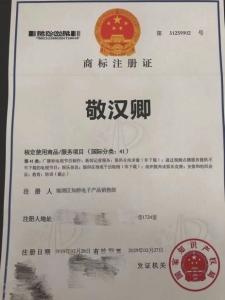The company frequently registered online celebrity’s name. After the incident was exposed, it showed weakness and made peace.

Jing Hanqing’s name was registered as a trademark.
The cybersquatting company first exposed the verbal threat and then showed weakness for peace.
On August 5, the reporter met Jing Hanqing. In the past few days, he was overwhelmed by the cybersquatting of his name, and even stopped the short video update.
Jing Hanqing introduced that on July 30th, he received an email from "Zhiqiao Electronic Products Sales Department in Jinghu District". The other party claimed that he was the holder of the registered trademark of Jing Hanqing, and said that WeChat official account, a platform operated by Jing Hanqing, had infringed their exclusive right to use the registered trademark.
In this regard, Jing Hanqing is puzzled. Then he released a video telling fans that the name he had used for 22 years could not be used.
Unexpectedly, a few days later, the other party sent another provocative email: "I wanted to deal with it gently. To tell you the truth, the trademark has been changed several times. If you don’t understand, hire a lawyer early, hire a good team, and don’t fool around all day … …”
Seeing this email, Jing Hanqing realized the seriousness of the matter. Not only that, Jing Hanqing also received an infringement complaint when he logged into his self-media account. "They may want to blackmail me with trademarks and let me buy them back." Jing Hanqing said.
After Jing Hanqing’s experience was exposed, it immediately attracted the attention of many netizens and the solidarity of other bloggers and lawyers. Perhaps for fear that things would get worse, on August 5th, the company sent a third email to Jing Hanqing, and the tone was obviously softened: There is no point in tossing it over again. Leave a contact information to check with our agent. Next, we will give up sending you the trademark.
Online celebrity trademarks are frequently registered, and some companies specialize in malicious registration.
Jing Hanqing did not expect that his "positive" relationship with this company attracted many people in the same boat. After this incident, many talented people in online celebrity have come forward to speak out and said that they have encountered similar incidents.
The game blogger "Falling Star Commentary" has the same experience. This account has been in operation for 5 years, and has released short videos on multiple platforms, with 3 million fans.
Recently, "Falling Star Commentary" suddenly received a message from a company saying that its account has been registered as a trademark. What’s even more amazing is that the company that registered this trademark is the one that holds the "Jing Hanqing" trademark. In fact, this company has registered 103 trademarks in less than two years, most of which are online celebrity bloggers’ accounts.
The reporter sent an email interview to this company on August 4, and as of press time, he did not receive a reply from the other party.
In addition to Jing Hanqing and "Explanation of Falling Stars", many online celebrity, who has millions of fans, have also come forward to say that their accounts have been registered by different companies. In a WeChat group established by Jing Hanqing, more than 40 group members have the same experience, and more than one cybersquatting company is involved.
A blogger who asked not to be named said that he had been "blackmailed" into paying 350,000 yuan as a trademark transfer fee.
In fact, malicious cybersquatting has existed for many years, but in the past, it was mostly aimed at movie stars, enterprises and websites, and now such companies have turned their targets to online celebrity bloggers on various platforms.
The reporter inquired on China Trademark Network that the name "Jing Hanqing" has been applied for registration as a trademark by seven companies, and the earliest time can be traced back to May 2018, followed by May, June and August of 2018, and February, April and May of 2019, respectively. It was applied for registration by different companies.
Lawyer’s point of view: malicious cybersquatting can be invalid.
Wang Jingtao, a senior partner of Sichuan Sino-French Law Firm, said that at present, there are companies on the market that are looking for popular IP and rushing to register trademarks. After successful cybersquatting, these companies will launch "rights protection" to the cybersquatters, with the ultimate goal of benefiting from it.
Wang Jingtao said that he has taken over many similar complaints. "At present, the public’s understanding of the trademark market is not enough, and the trademark awareness is relatively lacking, which has led to some companies with ulterior motives taking advantage of it."
So, how to solve this kind of thing? Wang Jingtao suggested that it can be solved through legal channels. "If it can be judged that it is a malicious cybersquatting, you can apply for the trademark to be invalid."
However, in practice, safeguarding rights is not easy. There have been many cases before, in which the parties were registered for trademarks, and they chose to compromise because the cost of rights protection was too high.
Wang Jingtao reminded that everyone also needs to raise awareness of trademark registration. When registering platform accounts, it is necessary to register brand trademarks in advance to avoid such incidents from the source. (Reporter Shen Mengyu)